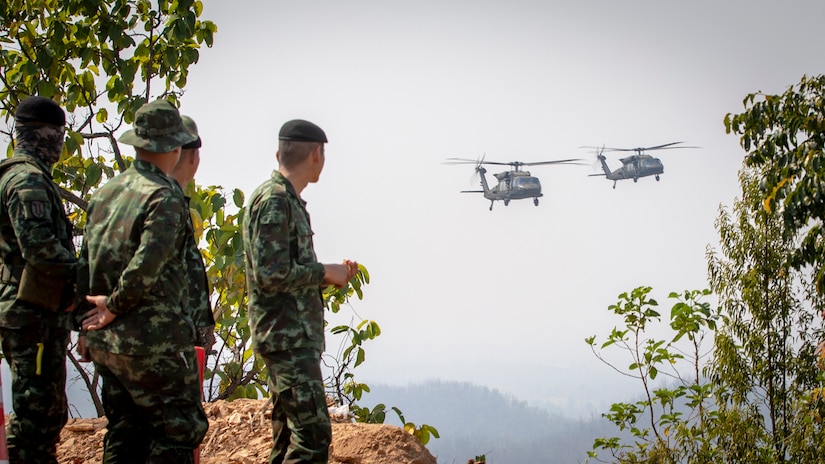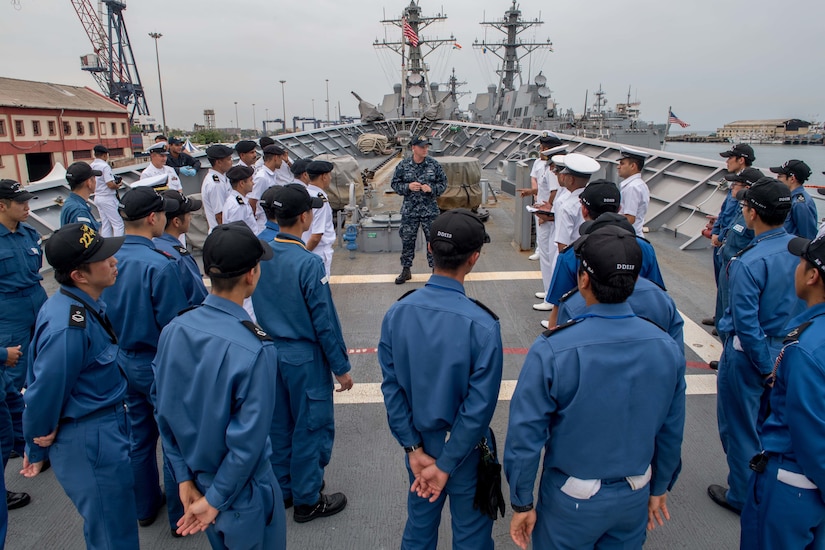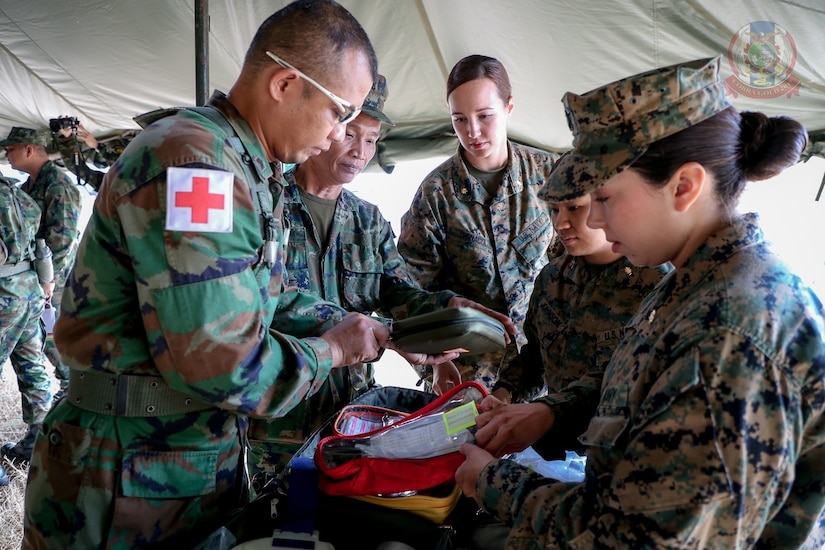Sept. 3, 2021 | , DOD News
There have been relations between America's military and the militaries of other nations since the United States first became a country. However, it wasn't until 1971 that the Defense Department created the Defense Security Assistance Agency — later renamed the Defense Security Cooperation Agency — to make security cooperation a formal function of the Defense Department.

Now a half century later, as DSCA turns 50 years old, it is still focusing on its original mission to build enduring partnerships between U.S. and partner nation militaries, making both participants stronger.
There have been many changes over the past five decades, but the value of Security Cooperation, or SC, to achieve our strategic goals has endured, according to DSCA Director Heidi Grant, the first permanent SES civilian to lead the agency. "Senior leaders across the U.S. government turn to the SC enterprise for solutions to help solve the most pressing U.S. defense and foreign policy challenges. In this era of renewed strategic competition, DSCA must play a leading role, guiding the SC enterprise into a new age of transformation and innovation," she added.
Security cooperation involves all the DOD interactions, programs and activities carried out with foreign security forces and their institutions. This includes exercises, training, armaments cooperation, information sharing, collaboration, foreign military sales, ministry advising and humanitarian assistance.
"Security cooperation is one of the most potent tools we have to affect U.S. national security interests and to influence the trajectory of the security environment around the world," said Jedidiah P. Royal, the deputy director of the Defense Security Cooperation Agency. It is DSCA that integrates activities across the entire security cooperation enterprise, Royal said.
"Security cooperation is our business," he said. "That manifests in a lot of different ways. But in particular, what we want to make sure is that for any objective that we have with an ally or partner nation or group of ally partner nations, that on a pragmatic, practical level, we are servicing what we have committed to."
That, he said, includes weapons sales, follow-on training and material support. DSCA facilitates a lot of weapons and equipment sales to foreign allies and partner nations. But those sales don’t just materially benefit those nations who buy American equipment — that's only part of the plan.
"I've been really pleased to see just how much growth there has been on doctrine level and on strategy development level, on the absorption of logistics and sustainment for these various pieces of equipment that we might be supporting our allies with, building their institutional capacity," Royal said. "In the past, it may have just been a little bit more focused on individual pieces of equipment. Now we're really looking at a relationship, a long-term relationship, and making sure that we attract allies and partners through not only a piece of equipment, but for a full spectrum approach."
Education for partner nation military personnel is a big part of what DSCA does, Royal said, and in fiscal year 2020 there were more than 27,000 students in the Defense Department's international military education and training program — helping the service members of foreign militaries develop their own skills, while at the same time learning how the U.S. military itself does business.

"We want the individuals in the loop that are making decisions from a strategy perspective or from a tactical perspective to be familiar with the way the United States incorporates our values into our national security enterprise," Royal said. "We want to see them doing the same things."
DSCA isn't just facilitating training and development for officers and leaders within the militaries of partner and allied nations. It's also working to ensure development of enlisted personnel, said Air Force Chief Master Sgt. Daniel Simpson, the senior enlisted advisor to the director at DSCA.
While the United States military has a strong noncommissioned officer corps, that isn't always the case with the militaries of other nations. A stronger NCO corps is something DSCA would like to help allied and partner nations develop for themselves as well, Simpson said.
"The enlisted corps forms the backbone of any military force," Simpson said. "You can't fly the planes, you can't operate the tanks, you can't operate any of the systems unless you have trained professionals to maintain, sustain, and in many cases employ them."
In the U.S., he said, those trained professionals are most often enlisted personnel. DSCA works to develop the enlisted forces or allied and partner nations through professional military education as well as through training and exercises, where the U.S. military services work face-to-face with allied and partner nation militaries on things like doctrine development, operations, maintenance and sustainment, said Simpson.
Another thing DSCA does is work to help partner and allied nations build their human resources capacity to better support a professional enlisted corps, Simpson said.
When it was first stood up on Sept. 1, 1971, the then-DSAA included the Foreign Military Sales Credit Program, the Military Assistance Program; the International Military Education and Training Program; and the Foreign Military Sales Program. Back then, the new agency had only 90 employees dedicated to security cooperation.
Today, DSCA has grown to more than 1,000 employees. And in 2019, DSCA stood up the Defense Security Cooperation University as well — a huge milestone not just for the agency, but for the 20,000 security cooperation professionals across the security cooperation enterprise. DSCU and DSCA, have played a critical role in educating and professionalizing the broader security cooperation workforce and enterprise.

DSCA schoolhouses, the Defense Institute of International Legal Studies and the Institute for Security Governance now fall under DSCU. DIILS serves as the lead U.S. defense security cooperation resource for professional legal engagement with international defense sector personnel. ISG was established as an international schoolhouse focused on strengthening civilian control of the armed forces and democratic governance, with particular emphasis on emergent democracies worldwide. The realignment of these institutions under DSCU enhances DSCA's Institutional Capacity Building programs.
"The vision of the university is to bring the entire education element and professionalization element of [the] security arm of the U.S. government under a single entity," Royal said.
The university concept, he said, among other things, provides rigor to security cooperation education and ensures more efficient and complementary relationships between once stand-alone security cooperation school houses.
Standing up DSCU, he said, was a "significant, inspired vision."
Today, to further enhance development and professionalization of the security cooperation workforce, Royal said DSCA is revising curriculum at the university and looking to also incorporate concepts from the Department of State as well.
"We're trying to bring them in more to be able to speak to those national security objectives ... and look for linkages between the diplomatic arm of the U.S. government and the security cooperation arm," he said.
Going forward, for the next 50 years, Royal said the agency is working on a strategic transformation to further enhance how the U.S. military does security cooperation.
"How we're moving forward is to focus our security cooperation efforts on a full spectrum, whole-of-nation approach with allies and partners, while simultaneously strengthening a diverse, certified, adaptable and resilient security cooperation workforce," he said. "I think that's really the driving thought behind us looking both externally and making sure that we are the tangible manifestation of the security interests from the White House on down, but also making sure that we're continuing to improve the overall workforce and our ability to meet those objectives."








No comments:
Post a Comment